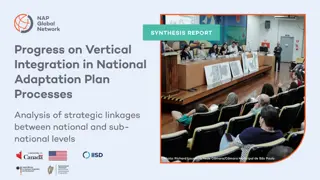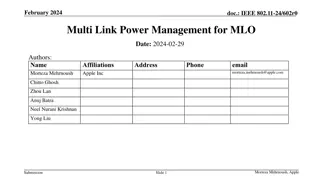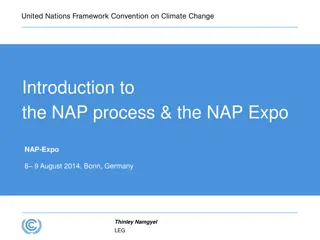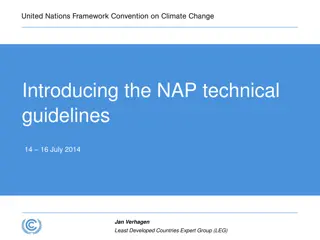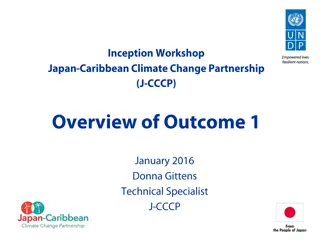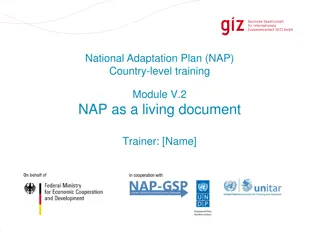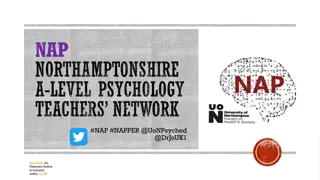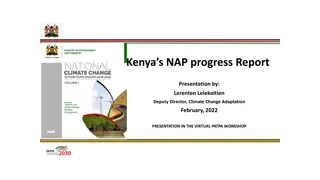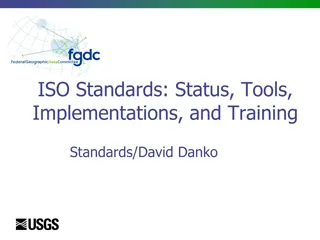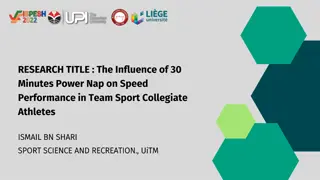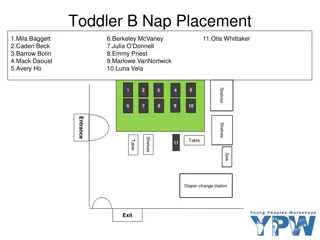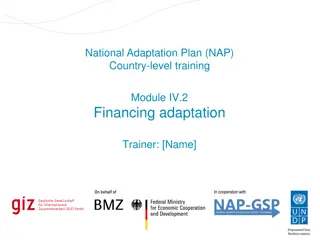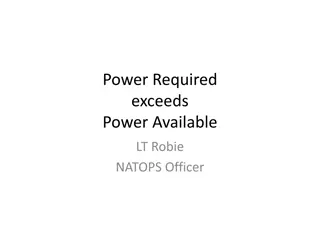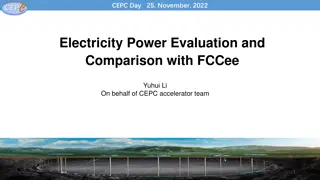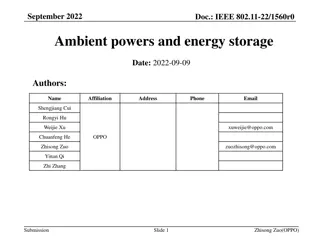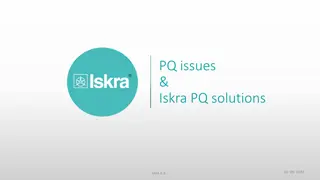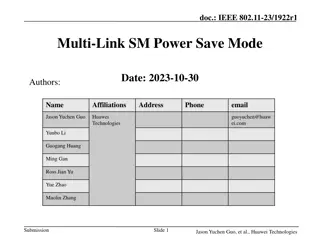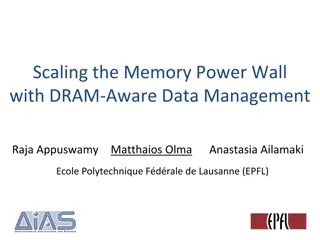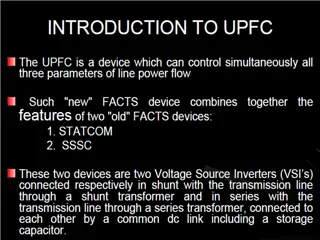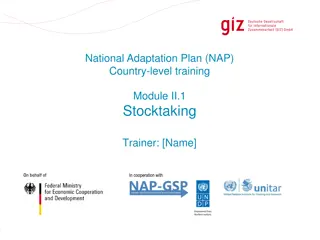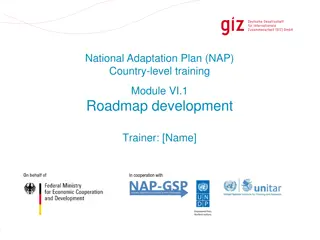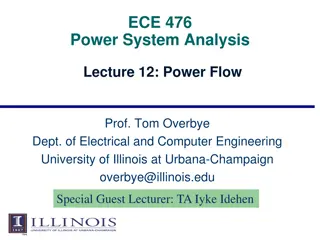Enhancing Climate Strategies through Regional Climate Weeks
Explore key outcomes and strategies discussed during Regional Climate Weeks to empower NAP implementation, ACE mainstreaming, and MEL processes. Address gaps in capacity building for effective adaptation planning and meaningful inclusion of all stakeholders.
0 views • 15 slides
Cisco Systems Fault Managed Power Portfolio Overview
Cisco Systems offers an industry-leading Fault Managed Power (FMP) patent portfolio comprising 24 active assets across seven INPADOC families. The portfolio includes patents supporting fault-managed power systems, PoE deployments, DC power distribution, DC-DC conversion, and HVDC connectors. The FMP
4 views • 4 slides
Vertical Integration in National Adaptation Plan (NAP) Processes: Insights and Best Practices
Explore the essential aspects of vertical integration in NAP processes, including entry points, enabling factors, roles of sub-national governments, involvement of non-governmental actors, community-based approaches, capacity building, and skill sets. Gain valuable insights from experts in the field
0 views • 10 slides
Just Resting My Eyes Tshirt, Birthday Gift for Him
We all know that guy (or maybe it's you!). The master of the midday snooze, the champion of the power nap. This birthday, celebrate their napping prowess with the hilarious \"Just Resting My Eyes\" t-shirt. It's more than just a shirt; it's a badge of honor for the individual who has perfected the a
0 views • 1 slides
Gaps and Guidance for National Adaptation Plans (NAP-GGGP)
The University of Twente and the Global Green Growth Institute present a comprehensive study on National Adaptation Plans (NAP-GGGP) focusing on best practices, guidelines for development, and lessons from plan evaluations at local levels. The NAP-GGGP framework includes 7 categories with 56 element
3 views • 10 slides
Improving Multi-Link Power Management Efficiency in IEEE 802.11 Networks
The document discusses challenges with per-link power mode changes in multi-link scenarios in IEEE 802.11 networks, proposing a solution for more efficient power management. It addresses issues such as latency and inefficiencies in signaling for power mode changes, introducing scheduled multi-link p
6 views • 9 slides
Mr. Wolf's Daily Routine Vocabulary Story
Join Mr. Wolf in his daily routine as he navigates activities such as waking up, having breakfast, brushing his teeth, getting dressed, attending playschool, having lunch, taking a nap, reading a book, and cleaning the dining room. Each step is accompanied by a simple sentence to help improve vocabu
4 views • 21 slides
Understanding Power Transfer and Impedance Matching in Circuits
Exploring the concept of maximizing power transfer between a source and load through impedance matching. Learn about complex conjugates, real and magnitude of complex numbers, average power in circuits, and the importance of minimizing reflected power. Discover how incident, reflected, and delivered
2 views • 33 slides
Hemp Farm Recordkeeping and Acreage Reporting Guidelines
Learn about the essential requirements for farm recordkeeping, acreage reporting, and NAP certification for hemp cultivation. Understand the process of obtaining a farm number with FSA, filing acreage reports, and the importance of meeting reporting deadlines. Discover what information is needed for
3 views • 16 slides
Overview of Farm Power Sources and Utilization in Agriculture
Farm power sources in agriculture include human, animal, mechanical, and renewable energy. Human power is costly but versatile, while animal power is traditional and provides manure. Mechanical power from tractors and engines is efficient. India's farm power sources reflect a mix of traditional and
0 views • 12 slides
Understanding Power Quality and Its Impact on Electrical Systems
Power quality refers to the characteristics of electrical power that drives sensitive equipment. It involves voltage and current deviations from ideal waveforms, impacting the efficiency and reliability of electrical systems. Various types of power quality phenomena exist, such as voltage variations
1 views • 16 slides
Understanding the National Adaptation Plan Process
The National Adaptation Plan (NAP) process, established in 2010, aims to help Least Developed Countries (LDCs) formulate and implement NAPs to address medium- and long-term adaptation needs. Guidelines for NAP formulation and implementation have been provided, with a focus on reducing vulnerability
0 views • 11 slides
NAP Technical Guidelines Overview
The NAP Technical Guidelines offer a structured approach for countries to navigate the National Adaptation Plan process, focusing on key elements such as groundwork, gap analysis, implementation strategies, and monitoring. These guidelines provide activities, steps, and questions to guide the formul
0 views • 17 slides
Understanding the National Adaptation Plan (NAP) Process
Explore the conceptual understanding of the NAP process, highlighting its characteristics, importance for countries, and relation to other national processes. Learn about the objectives of NAP, its flexible and integrated nature, and the focus on reducing vulnerability and mainstreaming climate adap
0 views • 13 slides
Advancing NAP Process in the Caribbean Region
Trained national teams in tool usage, budgeting for NAP process. Provided technical support for institutional arrangements, climate change mitigation options, NAMA design, and more in the Caribbean region.
0 views • 12 slides
Insights into National Adaptation Plan (NAP) Revision and Adjustment Process
Delve into the dynamic nature of NAP planning, emphasizing the necessity of regular revision and adaptation to evolving environmental, socio-economic, and political circumstances. Learn about adjusting goals, sectors, stakeholders, measures, and timeframes to align with changing conditions, illustra
0 views • 10 slides
Exciting Opportunities in Psychology Education Network - NAP Northamptonshire
Collaborate with Psychology educators through NAP Northamptonshire, a network bridging University of Northampton lecturers and local school teachers. Engage in informative events like the recent NAP launch. Explore topics like Cyberpsychology and Parapsychology with expert facilitators. Students can
0 views • 7 slides
Kenya's NAP Progress Report Presentation: Challenges, Methodologies, and Lessons Learnt
Lerenten Lelekoitien, Deputy Director of Climate Change Adaptation, presented Kenya's NAP progress report in a virtual workshop. The presentation covered what is monitored in the M&E system, methodologies used, challenges encountered, and lessons learnt. Key aspects included identifying priority act
0 views • 7 slides
Comparison of Metadata Standards: FGDC, ISO, and NAP
Explore the differences and commonalities between the Federal Geographic Data Committee (FGDC), International Organization for Standardization (ISO), and North American Profile (NAP) metadata standards. Discover the evolution, mandatory elements, code lists, and focus areas in these standards to bet
0 views • 14 slides
Neighborhood Assistance Program (NAP) Tax Credit 2023-24 Application Details
The Neighborhood Assistance Program (NAP) in Indiana offers $2.5 million in tax credits annually to non-profit organizations for neighborhood projects. The program provides a tax credit worth 50% of the donation value, administered by the Indiana Housing and Community Development Authority (IHCDA).
1 views • 30 slides
Impact of 30-Minute Power Nap on Speed Performance in Collegiate Athletes
Research investigates the influence of a 30-minute power nap on speed performance among collegiate team sport athletes. Results show a significant improvement in speed post-nap, indicating the potential benefits of incorporating power naps for enhancing physical performance. Various studies support
0 views • 7 slides
Neighborhood Assistance Program Overview 2019-20
The Neighborhood Assistance Program (NAP) in Indiana provides $2.5 million in tax credits annually to non-profit organizations. Administered by the Indiana Housing and Community Development Authority (IHCDA), NAP offers a valuable fundraising and capacity building tool for eligible organizations. Ta
0 views • 30 slides
Comprehensive Account Management Training Unit
This unit focuses on account management in the context of the National Enterprise Support Service (NESS) Application Portal (NAP) and the ROSS system. Trainees will learn how to request new NAP accounts, add ROSS users, assign user roles, manage access permissions, and more. The content covers diffe
0 views • 7 slides
Toddler Nap Placement for Different Groups
Explore the nap placement arrangements for toddlers in various groups - Toddler A, Toddler B, Early Preschool A, Early Preschool B, Early Preschool C, Preschool A, and Pre-K. Each group consists of different children, and the images depict the layout of nap areas with designated spots for each child
0 views • 9 slides
Understanding Climate Financing for Adaptation: NAP Country-Level Training
Explore Module IV.2 on financing adaptation in National Adaptation Plans (NAP). Learn about tracking climate financing, determinants of financing strategies, potential funding sources, and activities that require funding for adaptation. Discover the Climate Public Expenditures and Institutional Revi
0 views • 17 slides
Helicopter Power Management Guidelines
Understanding the factors that can lead to power required exceeding power available in a helicopter is crucial for safe operation. Indications such as uncommanded descent, rotor droop, loss of tail rotor authority, and right yaw signal potential issues to watch out for. Knowing when such occurrences
0 views • 11 slides
Exploring Power Efficiency in Computing Systems
In this lecture series on energy-efficient computing, various concepts related to dynamic frequency scaling, power capping, power shifting, power modeling, and power measurement are discussed. The impact of power on server speed is explored, alongside strategies for improving performance within powe
0 views • 17 slides
Comparison of Electricity Power Systems Between CEPC and FCCee
The evaluation and comparison of electricity power systems between the CEPC and FCCee accelerators reveal the power breakdowns, RF power consumption, magnet power supply, and overall power usage. Differences in power consumption for various components such as RF, magnets, and vacuum systems are high
0 views • 19 slides
Ambient Power Harvesting Technologies Overview
This document discusses various ambient power harvesting technologies such as RF energy, solar power, light, and thermal energy. RF-based energy harvesting utilizes radio waves for power transmission with potential applications in logistics, smart homes, and environmental monitoring. Solar power off
0 views • 12 slides
Power Quality Monitoring and Evaluation in Modern Energy Systems
Power quality is crucial for stable operations in energy systems. This content discusses issues in power supply, reasons for measuring power quality, consequences of bad power quality, methods for measuring power quality, and evaluation techniques for compliance reports. Tracking power quality param
0 views • 21 slides
Power Dynamics in the Hellenistic World: A Study of Olympias of Macedon
Exploration of power dynamics in the Hellenistic world through the multidimensional exercise of power by Olympias of Macedon. The study delves into various forms of power such as reward, coercive, legitimate, referent, and expert power, shedding light on their roles in shaping leadership and influen
0 views • 20 slides
Enhancing Power Efficiency in IEEE 802.11 Multi-Link SM Power Save Mode
The document discusses how Multi-Link Operation (MLO) in IEEE 802.11be can improve throughput and reduce latency but may increase power consumption for non-AP devices. It introduces the concept of Multi-Link SM Power Save mode to optimize power usage by activating multiple links only when necessary,
0 views • 10 slides
Understanding Power Consumption in Memory-Intensive Databases
This collection of research delves into the power challenges faced by memory-intensive databases (MMDBs) and explores strategies for reducing DRAM power draw. Topics covered include the impact of hardware features on power consumption, experimental setups for analyzing power breakdown, and the effec
0 views • 13 slides
Overview of Unified Power Flow Controller (UPFC) in Power Systems
A Unified Power Flow Controller (UPFC) is a combination of a Static Synchronous Compensator (STATCOM) and a Static Synchronous Series Compensator (SSSC) interconnected via a common DC link. UPFC allows bidirectional flow of real power and provides concurrent real and reactive series line compensatio
0 views • 20 slides
National Adaptation Plan (NAP) Stocktaking Training Overview
This training module provides insights into the importance of stocktaking in the National Adaptation Plan (NAP) process. Participants will learn about different stocktaking methods, utilizing stocktaking results for NAP development, and identifying gaps and needs. The session covers subjects like po
0 views • 14 slides
Understanding Leadership and Power Dynamics
Power and leadership are interconnected concepts, with power being the measure of a person's ability to influence others. Leaders have power in various situations, but it does not necessarily mean having power over people. Effective leaders balance their use of power with knowledge and trust, knowin
0 views • 9 slides
National Adaptation Plan (NAP) Coordination and Roadmap Development
This training module focuses on developing a roadmap for the National Adaptation Plan (NAP) process. Participants will learn about coordination structures, examples from different countries, and key elements of roadmaps. The session aims to guide participants in condensing key findings into a consis
0 views • 18 slides
Discussion on Sustainable Energy Solutions and Efficiency Improvements in Thermal Power Plants
The 20th India Power Forum held on 22nd November 2017 highlighted the importance of sustainability in the power business, focusing on the paradigm shift towards 24x7 power for all. Topics included decommissioning thermal power plants for more efficient and cleaner units, with insights from industry
0 views • 16 slides
Power System Analysis: Lecture on Power Flow
Lecture 12 on Power Flow Analysis in Power Systems covers the use of power balance equations when analyzing complex power consumption and generation. It explains the derivation of real power balance equations for iterative solutions in power flow analysis. The lecture highlights the need for iterati
0 views • 30 slides
Understanding Power Consumption and Temperature in Electronic Circuits
Explore the significance of power consumption in electronic circuits, focusing on reasons for high power, high temperature, and low reliability. Learn about sources of power consumption, types of power dissipation, dynamic power analysis, and the relationship between energy and power in circuits.
0 views • 30 slides


